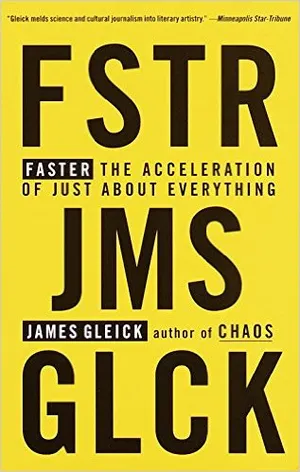Book Reviews: Faster
Faster by James Gleick
/https://tf-cmsv2-smithsonianmag-media.s3.amazonaws.com/filer/a0/20/a0209913-e654-437b-8851-dff10702946f/51khv5lfpl_sx315_bo1204203200_.jpg)
Faster
James Gleick
Pantheon, Vintage
The other day, in the midst of a business call, the woman I was talking with said, "Can I put you on hold for just a fraction of a second?" Fortunately, I had been reading James Gleick's Faster, so I picked it up to while away the time. Just about everything in life is accelerating, says Gleick.
We now live, Gleick notes, in a world where fast-food restaurants have express lanes; and where we laugh at a comedian saying, "I put instant coffee in my microwave and almost went back in time." Technology both caters to and fosters our acceleration. Gleick offers many examples, including a new option available on telephone answering machines, the quick-playback button. This feature allows for "handling callers who have droned on and on with their shaggy-dog messages." Exactly how, Gleick wonders, "did the manufacturers know you were so busy that you could not stand to listen to your friends speak with normal languor?"
There's less time for reading than there was, Gleick writes: "Your grandparents might have read at least one newspaper in the morning and another in the evening. USA Today caters to your more modern reading habits by keeping its copy short. Other newspapers have catered to them by going out of business.... Even the New York Times altered its traditions to accommodate a time-pressured reading style. Without explicitly repudiating its 'All the News That's Fit to Print' history, the newspaper began trying out a new slogan, still words of one syllable but fewer of them: 'Read What You Like.'"
How we read is mirrored by how we eat. Gleick describes us as "consumers-on-the-run of brightly packaged superconcentrated protein drinks and foodstuffs: Powerfoods, Soy Delicious! Energy Bars, or Hammer Gel ('endurance fuels' featuring 'protein powder')." A great many of us, he reports, adults and children alike, "eat breakfast on the way to their next activity....Dinner is not far behind on the road to obsolescence. Prepared, prepackaged meals — all descendants of the TV Dinner — now take up more supermarket space than fresh fruits and vegetables.... Bouillon cubes came into the world as a leap forward in time-saving. Now, who can spare time to unwrap the foil and heat the water? For that matter, heating water, a process subject to the constraints of physical law, has come to be seen as annoyingly slow. Hence the spread of Instant Hot and Quick & Hot faucets."
Everywhere Gleick looks, he sees signs of acceleration. And with acceleration comes impatience. Elevators offer another case in point: "Although there are still places on earth where people live full lives without ever seeing an elevator, the Otis Elevator Company estimates that its cars raise and lower the equivalent of the planet's whole population every nine days. This is a clientele that dislikes waiting....The fastest passenger elevators, mostly in Japan, travel at more than thirty feet per second. The record holder in the late 1990s was a special Mitsubishi elevator in a sightseeing tower in Yokohama: more than forty feet per second, a good climb rate for an airplane."
If technology speeds everything up to save time, Gleick ponders, "Where did all this saved time go?" He quotes a typical college syllabus for American Studies: "This course will examine why Americans today work more, shop for longer hours, and have less leisure time than they did in the 1960s." No one seems to have the answer, although there is a growing industry in books on how to simplify one's life, save more time and relax. Who has the time to read them all? Gleick informs us that the CEO of a telecommunications conglomerate has joked about the DayDoubler program all his customers seem to fantasize over: "Using sophisticated time mapping and compression techniques to double the number of hours in the day, DayDoubler gives you access to 48 hours each and every day...." where did all the time go?
Could we ever slow down, or even pause to meditate? Gleick seems to doubt it. "When the time comes to be alone with ourselves, we may crave the cellular phone at that," he writes. "Maybe alone with our thoughts, we feel that there just isn't enough to keep us entertained....It turns out to be difficult to travel far without a guide, even through our own familiar selves."
After finishing Faster, I walked across the street for a cup of coffee at a local café and met a friend. "How are you?" I asked. "Stressed. How are you?" she replied. When I said I hoped the rest of her day was easier, she was almost defiant: "If I wasn't stressed I'd be bored," she snapped. "I'd hate to be bored!"
